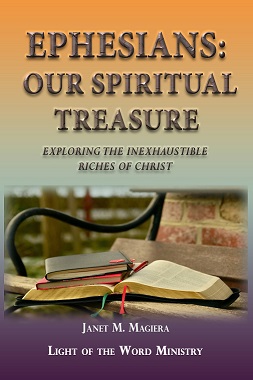
LESSON 2 ⸎ ALL SPIRITUAL BLESSINGS IN CHRIST
Ephesians 1:3 KJV
Blessed be the God and Father of our Lord Jesus Christ, who hath blessed us with all spiritual blessings in heavenly places in Christ:
In this short sentence, we are escorted onto the threshold of the house of riches that we have been given in Christ. There we are given the key to this house of spiritual treasures and invited in to explore it. A saint is one who has left the sphere of the natural and become a possessor of a heaven-born nature, so he must have heaven-sent supplies to nourish and develop it. These are the spiritual blessings in heavenly places it is talking about in this verse. It does not mean that we are in heaven right now, but the heavenly privileges and power that belong to Christ right now as the resurrected Lord are given to us so that we may live on a heavenly plane even though still actually physically on the earth. Ruth Paxson puts it this way:
Living in a non-spiritual world, he needs a spiritual atmosphere in which to breathe; spiritual food to eat; spiritual garments to wear; spiritual companions with whom to fellowship; spiritual exercise to keep fit and strong; spiritual strength to endure suffering and afflictions; spiritual weapons with which to war.[1]
These are not all of the kinds of blessings, only a few. All spiritual blessings is literally all blessings of the Spirit or EVERY blessing of the Spirit. This whole chapter is filled with blessings of what we have in Christ. In fact, the whole book of Ephesians is a masterful summation of our new life in Christ. The verb “blessed” in its simplest meaning is “to bow down” or “to bend the knees.” In fact, the word knee also comes from this verb. The verb also means “to bend the knee to bring a gift.” We needed to become children of God and receive salvation by humbling ourselves to God. Then he bestowed his blessing on us—filling us with his Spirit. We had to bow down and accept what the Lord Jesus had done for us in order to receive God’s blessings. Now we in turn bless God. God is blessed and He HAS blessed us and all of those blessings are OURS.
EXERCISE
In order to get this deep into our hearts before we go on, this is one way to let the individual phrases of this verse become deeply meaningful.
Recite the verse out loud.
- Read the verse with emphasis on each phrase and see how it changes the meaning. (Examples: BLESSED BE… ALL SPIRITUAL BLESSINGS… IN CHRIST…)
- Look up three other translations of the verse and write down your favorite one.
___________________________________________________________________________________________________________________________________________
IN CHRIST
The next part of this lesson is about the words “in Christ.” This is the key to heaven’s treasury and the opening of our understanding of its wealth. First, we will look at what the word “Christ” means.
The word Christ means simply, “the anointed one.” In Hebrew it is spelled Mashiach and in Aramaic Meshikha and we derive the English word Messiah from these. But what does anoint mean? In both Hebrew and Aramaic, the verb anoint means to rub on, pour on, smear or saturate and is spelled mashach in Hebrew and meshakh in Aramaic.
Acts 10:38 APNT
concerning Jesus, who was from Nazareth, whom God anointed [meshakh] with the Holy Spirit and with power. And this is he who traveled around and healed those who were oppressed by the Evil [one], because God was with him.
We can see several things right away without knowing anything about the word “anointed.” God anointed Jesus with Holy Spirit and with power. The result was healing and deliverance from the oppression of the Evil One. Then it says “because God was with him.” Let’s keep these things in mind while we are looking at the meaning of anoint.
Psalm 133 is the shortest Psalm and it describes how when Aaron was anointed as the high priest for Israel when the tabernacle was first started, it saturated him.
Psalm 133:2-3 ESV
It is like the precious oil on the head, running down on the beard, on the beard of Aaron, running down on the collar of his robes!
It is like the dew of Hermon, which falls on the mountains of Zion! For there the LORD has commanded the blessing, life forevermore.
When Aaron was anointed, as well as other prophets, kings and priests in the Old Testament, it was not just a few drops sprinkled on his head. It poured down all the way past his beard to his robes. He was saturated! When I was in Israel, we rode a cable car up to the top of Mount Hermon in the northern part of Israel. It is the highest mountain in the area. There was so much dew that we were soaked by the time we got up to the top! That is why the dew of Hermon is an apropos analogy to anointing.
Jesus was anointed with Holy Spirit and it saturated him. Men and women in the Old Testament were given the Spirit as a gift to them, but there were different amounts for different people. Jesus, the Anointed One, had the fullest amount of Spirit ever given to any person before.
John 3:34 ESV
For he whom God has sent utters the words of God, for he gives the Spirit without measure.
Now we come to see a word which will tie all the understanding together. That is the word “measure.” The verb meshakh in Aramaic is a homonym. That means it has two meanings depending on the context of the use. It is similar to our English word “bank.” Depending on the context, we understand a bank to be either place where money is or the edge of a river. The first meaning of the verb is “to saturate, pour,” but the second meaning is “to measure.” Since all the nouns formed from this root are related to the verb, some nouns also mean measure. The noun “measure” in Aramaic is meshukhtha. See how close it is to meshikha, or Christ? The anointing is the full measure of the Spirit that was in Jesus, the Anointed One. This becomes clear in Ephesians 4.
Ephesians 4:7 APNT
Now to each one of us is given grace according to the measure [meshukhtha] of the gift of Christ [meshikha].
Ephesians 4:13 APNT
until we all become one in the faith and in the knowledge of the Son of God and one mature man, in the measure [meshukhtha] of the standing of the fullness of Christ [meshikha].
God not only anointed Jesus with the full amount of Spirit, but then he gave it to us as a gift. We have the full measure of the anointing that was on Jesus! Our connecting point is that we all have the same gift. It is like a measuring cup that is full to the brim. We are all bonded together by the gift of the Holy Spirit, no matter where we are or how differently we may be in utilizing it. We have the same measure of the Spirit that was in Christ. That means we can walk like he walked: with his love, with his compassion, with his peace and with the same confidence that he had as God’s Son. Think about how he manifested love and compassion toward the people he was ministering to and with, and know that you have that same gift!
2 Corinthians 1:21-22 ESV
And it is God who establishes us with you in Christ, and has anointed [meshakh] us, and who has also put his seal on us and given us his Spirit in our hearts as a guarantee.
What is the purpose of the anointing? To do the same works that Jesus did with power and authority!! Heal the sick, raise the dead, and proclaim liberty to the captives! The same power that God anointed (saturated) Jesus with is OURS. Now we know what it is to have “Christ in us, the hope of glory” (Colossians 1:27). It is having the full measure of the Spirit of God in Jesus Christ.
In the Messiah, who is the Christ, the risen resurrected Lord, we have some wonderful things. To be “in” something means to belong to that “something.” The “in crowd” is a good example of a slang usage of the word “in,” If you are “in” something, you are not outside of it. Also, you have some specific qualities or characteristics which qualify you to be in the group. Once you’re “in,” then you can participate in all the activities of those who are included in that group.
The phrase “in Christ” in Ephesians describes our “in crowd” and what characteristics we have in that group because of what Christ accomplished and who he is. The first chapter of Ephesians is filled with the phrases, “in Christ,” “in whom,” “in him,” “in the beloved.” In fact, these phrases are used 10 times in the Aramaic translation in the first 14 verses.
[1] Paxson, Ruth, The Wealth, Walk and Warfare of the Christian, p. 26.


